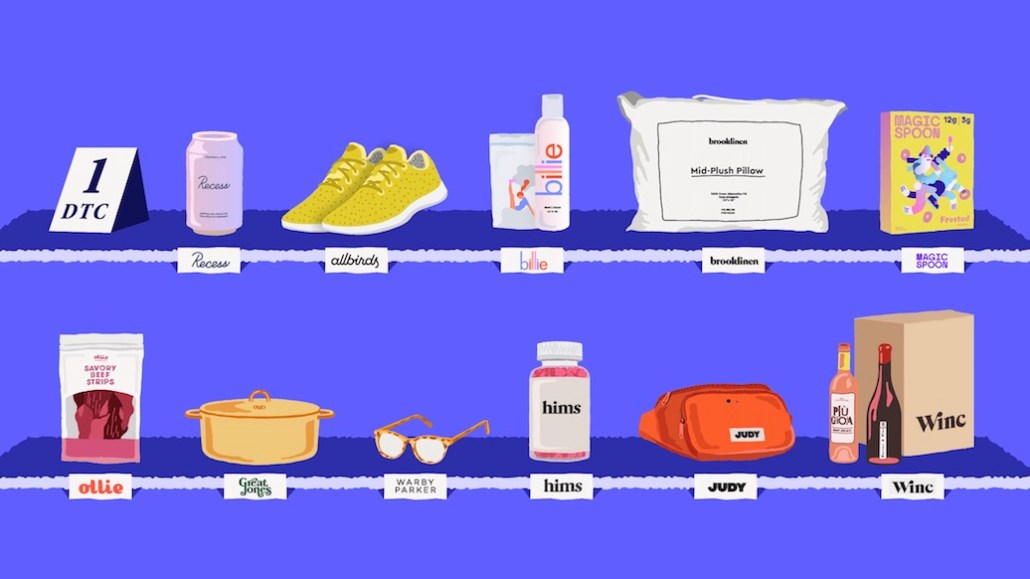Secure your place at the Digiday Media Buying Summit in Nashville, March 2-4
Fearing a holiday email onslaught, DTC startups turn to text messaging to promote sales

There’s no shortage of “last chance” sales hitting email inboxes these days, as desperate retailers like Gap and Macy’s are trying to squeeze some much-needed revenue out of shoppers.
But that also makes it harder for younger startups to grab customers’ attention, when every retail company in the world is trying to email them. As a result, some startups are turning to text message instead to promote sales or key events. Thinx, which sells period underwear, used text messaging to promote its 30% off sale in August. According to Brendan Hastings, Thinx’s vice president of engineering and digital product, 25% of customers who reached Thinx’s site through SMS made a purchase during the sale. Lensabl, which sells prescription lenses, eyeglass frames and contact lenses online, is planning to use text messaging to promote its Black Friday and Cyber Monday sales after seeing an increasing number of users opt to sign up for text instead of email notifications, according to CEO Andy Bilinsky.
To be sure, many DTC startups are still resisting holding sales. And it’s not the first time that startups have replaced emails with text messaging. But for those that are hosting sales, particularly during Black Friday and Cyber Monday, they are concerned about making sure that their sale stands out at a time when nearly every other retail company will also be running sales. And they believe that SMS is one way to do so, as customers are more likely to have given their email address to retail companies instead of their phone number. But, many customers aren’t yet accustomed to receiving text messages from retail companies, so those that do decided to text customers risk alienating those who think it is too spammy.
SMS use is already accelerating. According to marketing platform Omnisend the number of text messages e-commerce companies who use its software sent to customers increased by 239% year-over-year during the second quarter of this year. However, Omnisend’s clients still only sent 1.8 million text messages, compared to 2.4 billion emails during the second quarter.
“You have provided your email address to most e-commerce companies, but I think this is the really only the beginning stages of providing your phone number and getting your promos and communications via text message,” said Bilinsky.
Like many other DTC brands, Lensabl offers a first-time discount for customers of up to 20% off. Previously, when customers reached Lensabl’s home page for the first time, they would see a pop-up asking them to sign up for Lensabl’s email list in order to get the 20% off discount. About two months ago, however, Lensable tweaked the pop-up and gave customers the option of either giving their email address or texting the brand to receive the discount code. Bilinsky said that since then, about 40% of customers have opted to receive the discount via text instead of email.
“On days when we send out a text, we see the highest conversion of the week or of the month and I will say it probably converts twice as good as we see email on conversion with similar promos at this point,” Bilinsky said.
Now, Lensabl will send out about two emails a week to customers and two text messages per month, Bilinsky said. In the lead up to the holidays, Bilinsky said that the company is looking at sending one text message per week to customers. For Black Friday and Cyber Monday, the company won’t have a site-wide sale, but rather unique discounts for each of its products: prescription lenses, eyeglass frames and contact lenses.
But Lensabl walks a tightrope trying to figure out how to increase the number of text messages it sends customers without convincing users to unsubscribe. “[Text] is an invasive channel by nature,” he said.
Thinx, meanwhile, has been using text as a customer service line for the last seven months. Customers can opt to receive notifications via text when they place an order. For a sale the company ran at the end of 2019, it tested using text message to notify a limited cohort of customers about the sale. But the August sale marked the first time Thinx promoted a sale across its entire SMS list. During that most recent promotion, Thinx reported a click-through rate of more than 11% among customers whom it texted about the sale.
“We have more people signed up for our emails, so that was still a much larger revenue driver during the sale, but overall we were very happy with these results,” Hastings said.
Going forward, Hastings said that Thinx plans to text customers for about six to eight different initiatives throughout the year.
“If you’re signed up for our list, you will be hearing from us via SMS this holiday season, but our goal is to make sure we don’t feel like we’re spamming people and that every message is valuable and contains new information,” he added.
More in Marketing

Future of Marketing Briefing: AI’s branding problem is why marketers keep it off the label
The reputational downside is clearer than the branding upside, which makes discretion the safer strategy.

While holdcos build ‘death stars of content,’ indie creative agencies take alternative routes
Indie agencies and the holding company sector were once bound together. The Super Bowl and WPP’s latest remodeling plans show they’re heading in different directions.

How Boll & Branch leverages AI for operational and creative tasks
Boll & Branch first and foremost uses AI to manage workflows across teams.








